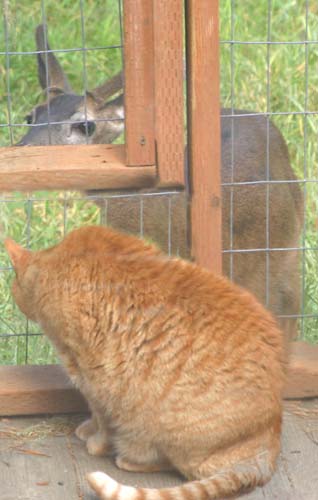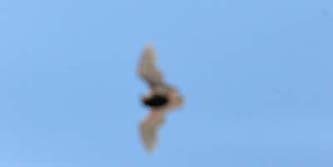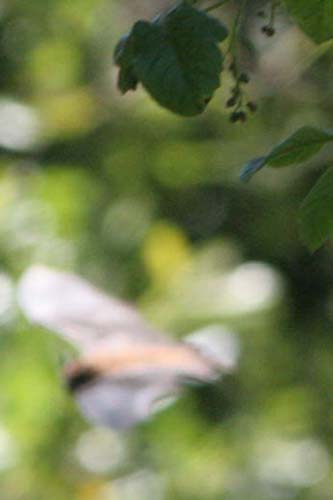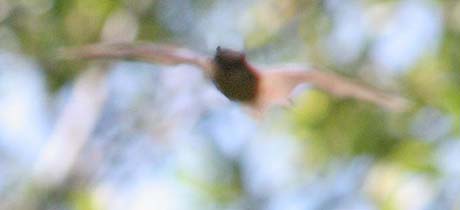FAMILY VESPERTILIONIDAE Vesper Bats
|
Western Red Bat
Lasiurus blossevillii
|
A
remarkable thing happened on the way to the Molera headlands on 7 June
2008. I entered the 'headlands patch' of willows and cottonwoods, on
the north side of the Big Sur River, just about noon. The wind was
howling but this spot was protected. As I got to the intersection of
the main north side trail and the headlands trail, suddenly there was a
medium-sized bat in flight just in front of me, at treetop level and
lower! It was almost hopeless to focus at a flying critter at this
range, but I tried (right and below). |
|
 |
What
was really most remarkable about this bat (the fuzzy thing in flight,
right, bottom of photo) was that the upperparts were orange!
They
were about the color of our cat, General Grant (left; in this picture
he's pondering the deer just outside his fenced in back yard in Pacific
Grove).
There is only one mid-sized bat in California that is this color: Western Red Bat. |
|
|
I
shouted for Rita and she got there in time to see it before it
disappeared — it may have gone to roost, having been accidentally
flushed from hanging like a dead leaf in a cottonwood along the river
(a favored behavior, when they are said to look like a little orange
ball; Reid 2006, Williams & Mies 2002). In this shot (left) you can
see the small rounded ears, widely separated, and even a whitish patch
on the inner part of the left wing, where in better photos there is a
white patch. |
|
|
I
realize that these are about the world's worst photos of a flying bat —
but they're all I've got, so I am happy to have them. This shot (below)
is in the shade, so the orange color is not obvious, but it does show
the rather short and rounded ears on either side of the bare face. A
detail that I was able to see with binoculars was a broad expanded tail
membrane that fully encompassed the tail. We see California Myotis and
Big Brown Bat over our Pacific Grove yard most nights in the summer. I
placed the size of this bat as decidedly larger than any Myotis, approaching the size of Big Brown Bat, but different in shape with long wings and short, broad tail membrane.
|
|
| In
checking the Museum of Vertebrate Zoology specimens on-line, none were
from Monterey County but there specimens from Fresno, Stockton, and
Davis between April–July. The on-line Key to Central California Bats,
created by Hastings NHR, says there are known records from Hastings
Reserve in Monterey County, plus at Pinnacles NM in San Benito Co.
Details there suggest this bat is highly migratory. This might explain
its presence at Big Sur River mouth on a windy day in early June. |
Literature cited:
Reid,
F. A. 2006. A Field Guide to Mammals of North America north of Mexico.
4th ed. Peterson Field Guide series. Houghton Mifflin, Boston.
Williams, K., and R. Mies. 2002. Beginner's Guide to Bats. Stokes Beginner's Guides. Little, Brown & Co., New York.
|
TOP
Page created 7 June 2008 |
|




